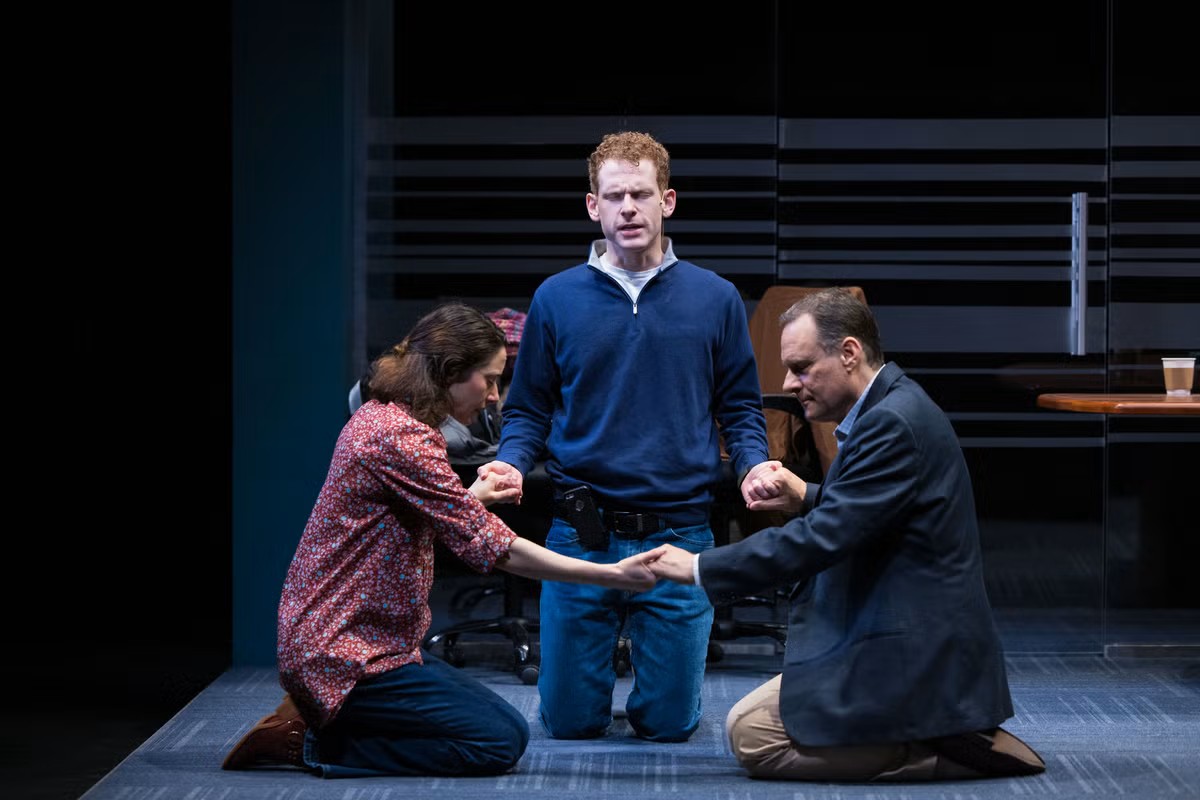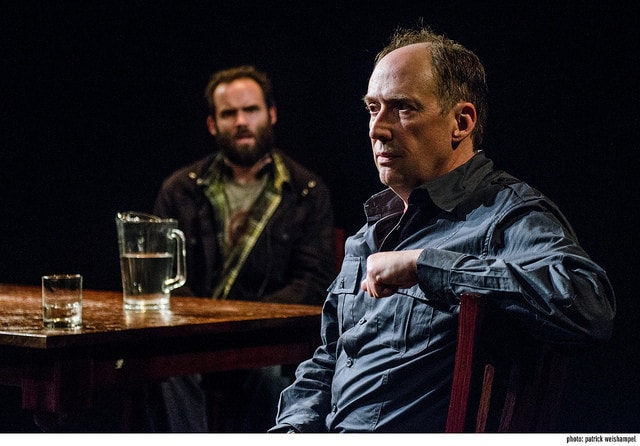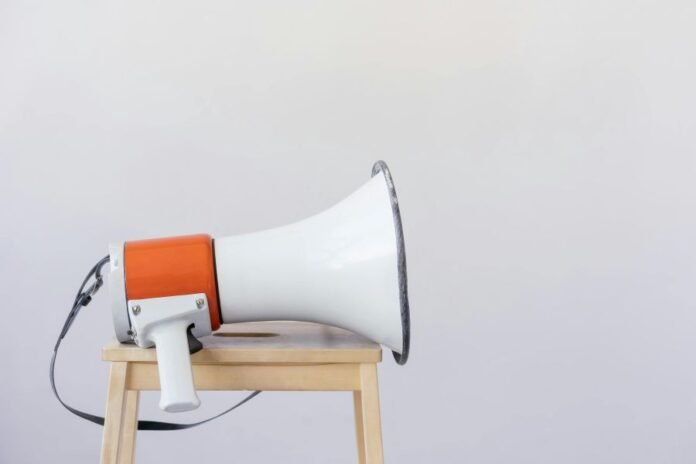The following is an excerpt from 40 Questions About a Political Play, now available via Calque Press.
Does anybody truly want to see a political play?
In the fall of 2023 I flew to Rochester, New York, for a workshop of my play about the 2012 massacre of 20 children and six teachers at Sandy Hook Elementary School in Newtown, Connecticut.
We did our tablework. Rain and wind, blood-coppery leaves whipped from limbs into the street outside the windows while the actors read aloud my distressing dialogue. The director, the dramaturg, the actors—all paused the script frequently to ask questions, and I’d answer without answering exactly (playwrights, like psychotherapists, know that we are most helpful when we let people arrive at their own conclusions, make their own choices). There were digressions about a father’s .22 Savage Mark II, an aunt’s Glock 20 Gen3, a cousin’s AR-15. Nobody at the table owned a gun, or so we assumed.
That week my daughter was at school in Los Angeles where we live, and her teachers were instructing the students to lock the doors, pull the blinds, crouch beneath desks, and try to make themselves as small as birds, quieter than birds, in the event that a prowling coyote should slip into the corridors. These students are smart; they know that coyotes don’t kill children. My daughter asked me on the phone that night: “Why won’t they tell us the truth?”
❦
How do I define a political play? It’s not necessarily a play about policy or political history. Not a meme or a stump speech brought to life by underpaid actors. Not a particular political party’s talking points in the mouths of characters in conflict with characters spouting the opposition party’s talking points.
A play is political if its subject is taboo and its story mirrors, exposes, and critiques the suppression and repression that interferes with the treatment of a cultural disease. A political play is a problem that is ignored, denied, maligned. A political play is, by definition, unpopular.
❦
Audiences have a problem with characters they dislike—or, apropos the political play, characters whose politics they dislike.
My play about Sandy Hook premiered in the spring of 2024. Somebody saw it and was outraged, and naturally she took her outrage to social media. The characters in my play believe that the Second Amendment to the U.S. Constitution guarantees them unfettered access to firearms. This playgoer mistakenly assumed that I agree with my characters. The playwright is synonymous with the character(s), she believed. She’d never been more offended by a play—“not since Oleanna,” she wrote. Luckily for my ego, her post did not garner many likes.
But I once heard a much-lauded, venerable playwright declare that the audience is never mistaken. The playwright is always to blame—or to praise. Should we only create characters whose politics we agree with?
❦
Are political playwrights preaching to the choir? If a play’s politics align with the consensus in an audience, then—the theory goes—there’s no good reason to produce the play or to write it in the first place. A political play won’t change anybody’s mind if those with minds in need of changing are nowhere near the inside of a theatre.
This criticism involves two assumptions. First, that plays are written and produced by liberals and progressives for liberal and progressive audiences. As a generalization this is indisputable. But the exception proves the rule: a conservative or centrist who happens to be attending the theatre with liberal or progressive friends; who is young and open-minded; who is lost.
The second assumption is that a political play’s only purpose is to alter an audience’s beliefs. But a play may serve to galvanize those who already share the play’s politics, offering consolation, inspiration, and a renewed impetus to implement the play’s conclusions in the artless world outside the theatre (see Brecht).
Not to mention that political plays and musicals can influence a culture when only a relatively small percentage of the population has seen the works in question. Angels in America, Parts One & Two (1993) and Hamilton (2015) spring to mind.
And remember that sometimes a choir needs a preacher, or better yet a prophet. Playwrights who are brave, or foolish, or brave and foolish, will feel compelled to challenge the audience’s most ingrained political assumptions.
❦
Many who saw my play about Sandy Hook received it as I’d hoped they would. I don’t mean to complain. I’m curious. Somebody posted on social media that the play was “powerful” with a “stellar” cast and “brilliant” direction, but then this: “When we decided to buy tickets we were well aware that this play would not provide an evening of entertainment.”
I happen to believe that a political play can provide entertainment. But then what are we talking about when we talk about entertainment?
“Powerful,” “provocative,” audiences say, when they have enjoyed a political play. Also “important,” which I have always interpreted as damning praise. The Important Play may win some awards. But isn’t “important” as much a warning as an endorsement?

Voting is important. Retirement planning. Hygiene. The exhortation that we pay exorbitant prices for tickets to the Important Play is about as welcome as a doctor’s recommendation that we drop sugar from our diet.
I have dropped sugar from my diet. It hasn’t been easy: sugar (and high fructose corn syrup) is laced into almost everything. Like bread. I cut out sugar because a surgeon, after cutting out 15 percent of my liver in order to excise two cancerous lesions, told me, “Dropping sugar will improve your chances of survival. It’s important.”
Is entertainment in a play like sugar?
I don’t drink anymore either. The surgeon who advised me to drop sugar said I ought to do the same with alcohol. I don’t miss it. Except perhaps at the premiere of one of my plays, when I used to need a preshow cocktail to steady my nerves, to numb myself. Then a few more drinks to withstand the opening night party.
Not long ago, after reading some poems at the launch of a literary magazine, I walked offstage and was handed a flute of champagne. I thought it was sparkling water and sipped. As soon as the taste hit my tongue I spat it back out. I don’t wish to be numb after cancer because I do not wish to be dead.
Do audiences wish to be numb, or dead?
❦
Is the theatre dead by design? If not dead, then the theatre is dying and has been for ages. It is an old art form, after all. Some would say ancient.
Theatre is popular with ancient people. This was true when I was writing my first plays at the turn of the century. New playwrights were expected to please their elders. I didn’t want to please anybody, so my plays displeased my elders. “Talkbacks” were terrorizing; I’d cower in a folding chair on a stage that felt like the bloody sands of the Colosseum, waiting for elderly audience members to swivel their thumbs up or down.
Some feedback from talkbacks seared into my memory:
“I hate to tell you to start over, but start over.”
“Your play is like an indigestible soup.”
“Is your play even a play?”
❦
Relatedly: Why risk offending the audience’s politics? If this isn’t always a question for playwrights, it’s certainly a financial consideration for producers, especially in the post-Covid-lockdown era of anemic attendance.
Offence in a play is often judged as an artistic flaw, when in fact offence may prove the play’s power and relevance. Offence may demonstrate that the artists involved understand the theatre’s unique ability, and sacred responsibility, to profane in service of the truth.
❦
Aren’t political plays quickly dated? Plays about the Vietnam War are dated, buried beneath the historical strata. Plays about the wars in Afghanistan and Iraq, plays about fracking, plays about Jan. 6, 2021, etc.
“Nonpolitical” plays also become dated in style, form, content. Every play is dated and more dated by the hour. Shakespeare. In a hundred years (or five hundred, or a thousand) nobody will understand or care about Shakespeare’s plays.
I once heard a much-lauded, venerable playwright say that it took an average of six years for his plays to find their premiere productions. I was 22 and my heart sank. But I have been writing plays ever since that age, and my timeframe has been more or less the same. A playwright needs to have precognitive abilities to write a timely play. A playwright needs to own a theatre.
I tell myself: Write while accepting that your plays will be buried beneath the strata. Write while you’re alive about being alive. Write for those who are alive with you. You may get lucky. Aim for eternity and you’ll miss.
❦
A thought experiment: the American theatre calls a moratorium on Shakespeare. And A Christmas Carol (1844). No more revivals. Producers, if they wish to present a play or musical, must make something new. For five years, 10. Nothing-but-new-work: would it exterminate or cure a dying theatre?
❦
In 2016, during my nine months of cancer treatment—two major abdominal surgeries and 12 rounds of intensive chemotherapy—I lacked the patience and the concentration for reading. I lacked the immunological fortitude for sitting inside a theatre. I watched TV and movies on my sundry screens. Passive, often supine, I could pretend and (temporarily) forget.
I enjoyed comedies for the obvious reasons. The Olympics for the reminder of what a body can achieve. Home makeover shows for the fix of the formulaic metamorphosis. British detective mysteries for the flirtation with mortality, but also the quaintness and neatness of the puzzles. Nothing bleak or heavy. Nothing about cancer because I was living that trauma and wished only to escape.
Are political plays unpopular because the populace is traumatized and wishing only to escape?
For a long time I wanted to write about the so-called War on Terror but I was afraid of inauthenticity. I had never been to war, didn’t have friends or loved ones who had served. I grew up in an affluent suburb of New York City (albeit in a family without much money). My PTSD was of the miserable childhood variety.
Then I met Paul Watson, a combat journalist who believes that his Pulitzer Prize-winning photograph from Mogadishu in 1993 led to the U.S. withdrawal from the region, and taught a nascent Al-Qaeda the lesson that a single image of weakness can diminish and perhaps defeat a superpower. He blames himself—arguably, partially—for the September 11 attacks and the subsequent wars in Afghanistan and Iraq. I heard Paul on the radio in 2007, emailed him, and spent years getting to know him before I wrote a word about him. My political play about war became also a personal play about psychological damage and the healing potential of friendship.

In my play “Paul Watson” tells “Dan O’Brien” (paraphrasing Camus) that war “lives in each of us. In the loneliness and humiliation we all feel. If we can solve that conflict within ourselves then we’ll be able to rid the world of war.”
Is the political inextricably personal?
At some point I asked Paul Watson why he allowed me to write about him, and he replied that he had no choice. He felt responsible, guilt-stricken, in his personal role as a journalist whose job it was to chase after trauma, and in his political role as a Canadian employed by a U.S. newspaper when both nations are culpable—arguably, partially—for so much global conflict. He said that he regarded me as his “confessor.” I feel similarly responsible, guilt-stricken, when writing my plays about Paul Watson, about Sandy Hook, about cancer, and about the abuse in my childhood.
Is a personal political play a confession?
❦
My heart aches. Does your heart ache too?
❦
My heart lifts with joy; both the joy and the ache are surprising. Isn’t a fundamental pleasure of a play the expectation of surprise?
❦
Doesn’t every compelling play give pleasure? The pleasure of writing it and watching it. The pleasure of recognition and reflection. The pleasure of anonymized empathy in the dark. The pleasure of witnessing and making use of the truth, even when the truth causes pain.
A political play makes pain pleasurable. A political play in an age of distraction, denial, delusion, makes the painful truth a pleasure to entertain.
Dan O’Brien is a playwright, poet, and nonfiction writer. His play Newtown is the recipient of the 2024 Blanche and Irving Laurie Foundation Theatre Visions Fund Award. He lives in Los Angeles.






